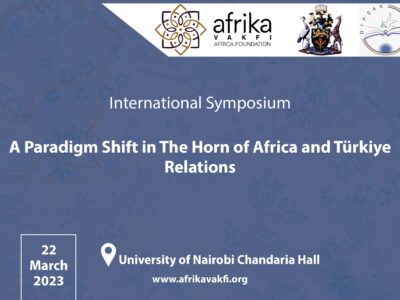“A Paradigm Shift in the Horn of Africa-Türkiye Relations” International Symposium Report
On 22nd March 2023, Africa Foundation held an international symposium entitled “A Paradigm Shift in the Horn of Africa-Türkiye Relations” in cooperation with the University of Nairobi and the Diplomacy Scholars Association of Kenya (DIPSAK) in Nairobi, Kenya. The symposium was organized to explore the recent geopolitical and geostrategic reasons for the increased engagement between the two regions. The event included three sessions, each focusing on a specific topic related to the changing relationship between the Horn of Africa and Türkiye.
The first session, moderated by Prof. Maria Nzomo, was entitled “Challenges in the Face of the Proliferation of Security Issues.” Five presenters discussed various aspects of this topic.
Samuel Mwiti Njagi’s presentation, “A Critical Analysis of Turkiye’s Role in AU’s Peace and Security Architecture: Case Study of Somalia,” highlighted Türkiye’s significant role in promoting security in the Horn of Africa, particularly in Somalia. Although Türkiye’s engagement in the peace and security architecture of the African Union needed to be formalized, Njagi argued that Türkiye had played an essential role in the agenda-setting and training of security agencies in Somalia.
In the second presentation, Abdurrahim Sıradağ discussed Türkiye’s increasing security role in the region and its strategic impact. Sıradağ argued that Türkiye’s security policy in the Horn of Africa gained a new dynamic by opening a military base in Somalia in 2017, allowing Türkiye to play an essential role in rebuilding the Somali army and police force. Sıradağ also examined the effects of Türkiye’s security and defense agreement with Kenya in 2014, providing valuable insights into Türkiye’s growing presence in the region.
In the paper presented on behalf of Patrick Maluki, the region’s importance due to its contiguity to the trade artery that stretches from the Indian Ocean to Europe through the Red Sea and the Suez Canal was discussed. The study entitled “The Role of Türkiye in Energy Security in the Horn of Africa drew attention to Türkiye’s increasing role in energy security and its significant implications for the region’s economic development.
Yunus Turhan’s presentation entitled “Ethiopia at a New Crossroads: National Accord or Discord?” discussed the possible outcomes of the Tigray crisis in Ethiopia, highlighting the importance of a deeper analysis of the Tigray conflict its implications for the broader region. Calling for urgent action to address the crisis and prevent further destabilization, Turhan defined potential fields of cooperation between Türkiye and Ethiopia on the subject.
The final presentation delivered by Zerihun Berhane pointed out the impact of climate change on the Horn of Africa region, which has a rich physical environment but plagued by long-standing conflicts, environmental degradation, poverty, and underdevelopment. Berhane’s analysis of climate change’s current and future consequences in the Horn of Africa highlights the challenges and opportunities for Türkiye’s economic and political relations with the region.
The symposium continued in the afternoon with the second session titled “Institutionalization of Cross-Sectoral Economic Engagement,” moderated by Dr. Kizito Sabala.
Fred Jonyo delivered the first presentation of the second session, it was titled “The Political Economy of Kenya-Türkiye Relations.” Jonyo argued that the economic relations between Türkiye and Kenya are mutually beneficial. Both countries must diversify their economies and remove trade restrictions to tap into the gains of their bilateral engagements fully. Abdulqadir Adem’s presentation, titled “Türkiye Horn of Africa Relations: A Political Economic Perspective,” gave a larger view and examined Türkiye’s growing geopolitical, security, and economic presence in the whole Horn of Africa region.
Maria Nzomo presented their work “Second Scramble for Africa? The Case of Türkiye-Horn of Africa Development Assistance Engagements,” coauthored with Winnie Rugutt. She gave an analysis of the role and impact of Türkiye’s presence in Africa, particularly in providing development assistance to the Horn of Africa.
The fourth presentation by Chaofan Yu was titled “State-business Relations in Africa: A Comparative Study of Chinese Industrial Zones and Turkish Construction Projects” and compared the state-business relationship of Chinese industrial zones in Ethiopia and Nigeria to Turkish construction projects in Ethiopia and Tanzania. She presented her findings highlighting that China mainly deployed state-owned enterprises as economic statecraft, while Türkiye actively cooperated with private companies to support their African projects.
Finally, Fatma Kantaş Yılmaz and Pınar Güngör Ketenci presented their work in which they conducted a comparative analysis of healthcare system indicators in Djibouti, Eritrea, Ethiopia, and Somalia in the Horn of Africa. The study used data envelopment analysis to examine healthcare indicators such as life expectancy, mortality rates, and healthcare expenditure. The findings revealed that the countries were inefficient in utilizing their inputs to achieve the desired outputs.
In the symposium’s third and last session, entitled “Opportunities with the Multiplication of Diplomatic Spaces,” moderated by Mesut Özcan, five studies were presented.
The first study, presented by Mumo Nzau, explored strategic options for Türkiye-Horn of Africa relations in the 21st century’s competitive and globalized world. Nzau emphasized the importance of ensuring sustainable cooperation and healthy competition to avoid conflictual relations.
Fathe Wozir delivered the second presentation and discussed the role of soft power in advancing diplomatic and cultural ties between Türkiye and Ethiopia. Wozir highlighted the existence of several Turkish social institutions in Ethiopia and Türkiye’s emphasis on cultural diplomacy to promote its overseas relations.
Safa Uslu presented the study they coauthored with Mücahit Küçükyılmaz and assessed Türkiye’s sub-Saharan Africa strategy in the context of the center-periphery concept. They explained how Türkiye’s Islamic political movement, which evolved from the periphery to the center, impacted Türkiye’s sub-Saharan Africa strategy. Uslu drew attention to Türkiye’s soft power, its potential to be a role model, its popular culture, and its non-colonial history as crucial elements in developing Türkiye’s African politics.
In the fourth presentation, Molla Asmare gave an analysis of the role of the Türkiye-Horn of Africa Alliance in energy development. Asmare discussed the challenges, opportunities, and outlooks of the alliance, highlighting Türkiye’s growing interest in the Horn of Africa’s energy resources.
Finally, Hacer Atabaş and Mehmet Köse presented their research on “An Empirical Analysis of the Turkiye Graduates’ Impact in the Horn of Africa.” Examining the impact of Turkiye graduates on the relationship between Turkiye and the Horn of Africa and their contribution to the region’s development, they offered insights into pertinent programs and international cooperation based on alum endeavors.
Overall, the symposium “A Paradigm Shift in the Horn of Africa-Türkiye Relations,” held on 22nd March 2023, aimed to explore the changing relationship between the Horn of Africa and Türkiye. It successfully met its objectives with three informative sessions that shed light on the various aspects of their evolving relationship. The first session focused on the potential collaboration for security issues in the region, the second on developing economic engagements on different levels, and the third on diversifying diplomatic ties.
The symposium offered a platform for scholars and experts to exchange ideas and insights on the changing relationship between the Horn of Africa and Türkiye. The papers presented at the symposium critically analyzed Türkiye’s role in promoting security, economic development, and political activism in the region. The symposium demonstrated that Türkiye’s engagement in the Horn of Africa region is growing in different dimensions, and it could lead to a positive shift in the region’s geopolitical landscape.

